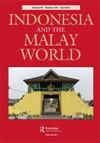The illegal as mundane
IF 0.9
3区 社会学
0 ASIAN STUDIES
引用次数: 2
Abstract
ABSTRACT Ways of studying illegal behaviour are important in the context of Indonesia, a country well known for its failure to deal adequately with the corruption that permeates every level of society. They are perhaps even more salient at the peripheries of the nation-state where government agencies struggle to contain the illegal practices that necessarily emerge where nation-states meet. This article reflects on our experiences conducting a decade-long study of an Indonesian borderlands that, while not initially focused on illegality, came – as a consequence of its ubiquity – to include it as a key construct. This experience led us to grapple not only with methodological questions about how to research illegality but also with assumptions about what illegality is and does. We argue that the only way to recognise and account for the quotidian nature of many kinds of illegal activity in the borderlands is to eschew an ethnography of exception in favour of an ethnography of the mundane.非法就是世俗
摘要在印度尼西亚,研究非法行为的方法很重要。印度尼西亚以未能充分处理渗透到社会各个阶层的腐败而闻名。它们在民族国家的边缘地区可能更为突出,在那里,政府机构努力遏制民族国家聚会时必然出现的非法行为。这篇文章反映了我们对印度尼西亚边境进行长达十年的研究的经验,尽管最初没有关注非法性,但由于其普遍性,最终将其作为一个关键结构。这段经历使我们不仅要解决如何研究非法性的方法论问题,还要解决非法性是什么和做什么的假设问题。我们认为,承认和解释边境地区许多非法活动的日常性质的唯一方法是避开例外的民族志,而选择世俗的民族志。
本文章由计算机程序翻译,如有差异,请以英文原文为准。
求助全文
约1分钟内获得全文
求助全文
来源期刊

Indonesia and the Malay World
ASIAN STUDIES-
CiteScore
2.00
自引率
0.00%
发文量
17
期刊介绍:
Indonesia and the Malay World is a peer-reviewed journal that is committed to the publication of scholarship in the arts and humanities on maritime Southeast Asia. It particularly focuses on the study of the languages, literatures, art, archaeology, history, religion, anthropology, performing arts, cinema and tourism of the region. In addition to welcoming individual articles, it also publishes special issues focusing on a particular theme or region. The journal is published three times a year, in March, July, and November.
 求助内容:
求助内容: 应助结果提醒方式:
应助结果提醒方式:


